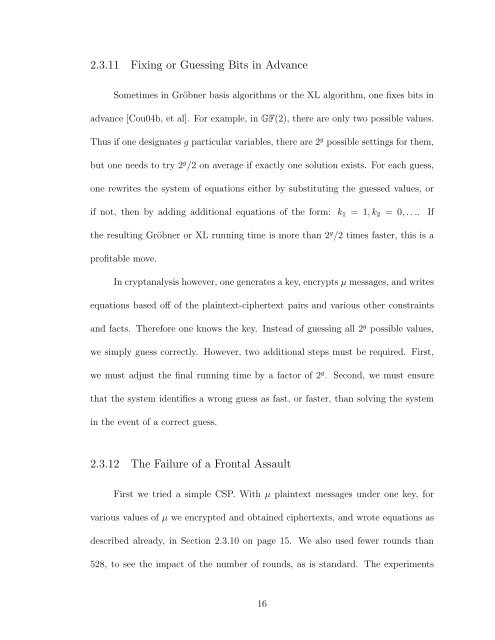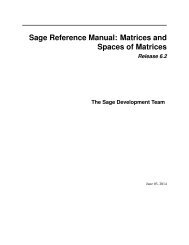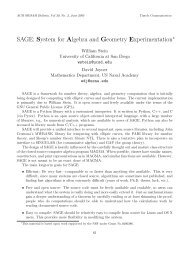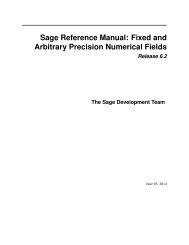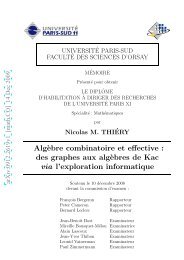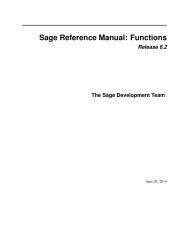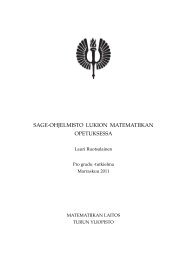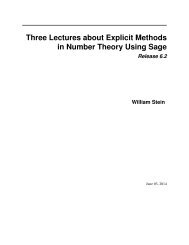- Page 1 and 2: ABSTRACTTitle of dissertation:ALGOR
- Page 3 and 4: ALGORITHMS FOR SOLVING LINEAR AND P
- Page 5 and 6: PrefacePigmaei gigantum humeris imp
- Page 7 and 8: ForewordThe ignoraunte multitude do
- Page 9 and 10: AcknowledgmentsI am deeply indebted
- Page 11 and 12: NSF grant for the Sage project [sag
- Page 13 and 14: for many years and taught me matric
- Page 15 and 16: 3 Converting MQ to CNF-SAT 353.1 Su
- Page 17 and 18: 6.4.4 The Conservative Algorithm .
- Page 19 and 20: B.1 Algorithms and Performance, for
- Page 21 and 22: List of Algorithms1 Method of Four
- Page 23 and 24: Chapter 1SummaryGenerally speaking,
- Page 25 and 26: adopted the author’s software lib
- Page 27 and 28: Part IPolynomial Systems5
- Page 29 and 30: 2.1 Special Acknowledgment of Joint
- Page 31 and 32: Figure 2.1: The Keeloq Circuit Diag
- Page 33 and 34: around regions of ones of size 32,
- Page 35 and 36: the bit generated in the 528th and
- Page 37: β = aeSince the non-linear functio
- Page 41 and 42: 2.4.3 The Consequences of Fixed Poi
- Page 43 and 44: points. If it is the case that f k
- Page 45 and 46: 2.4.6 Fraction of Plainspace Requir
- Page 47 and 48: Then we can apply the probability d
- Page 49 and 50: e the case for all block ciphers. T
- Page 51 and 52: Thus h has p fixed points with prob
- Page 53 and 54: expected points. Since we require f
- Page 55 and 56: too long, we may elect to “guess
- Page 57 and 58: Chapter 3Converting MQ to CNF-SAT3.
- Page 59 and 60: Another NP-hard problem is finding
- Page 61 and 62: 3.3 Notation and DefinitionsAn inst
- Page 63 and 64: Step One: From a Polynomial System
- Page 65 and 66: x 1 + x 2 + x 3 + y 1 = 0y 1 + x 6
- Page 67 and 68: Table 3.1 CNF Expression Difficulty
- Page 69 and 70: that a satisfying solution is found
- Page 71 and 72: andomness is seeded from a hash of
- Page 73 and 74: Figure 3.1: The Distribution of Run
- Page 75 and 76: takes only a few seconds. Furthermo
- Page 77 and 78: 3.5.4 Comparison with MAGMA, Singul
- Page 79 and 80: systems of equations over finite fi
- Page 81 and 82: Table 3.4 CNF Expression Difficulty
- Page 83 and 84: polynomial equation. The number of
- Page 85 and 86: of variables, and the operators fro
- Page 87 and 88: variables). However, the original v
- Page 89 and 90:
of variables that it contains.When
- Page 91 and 92:
If the contradiction stack becomes
- Page 93 and 94:
enough to produce a contradiction.I
- Page 95 and 96:
those two simple examples).Over the
- Page 97 and 98:
Chapter 5The Method of Four Russian
- Page 99 and 100:
matrix without calculating the othe
- Page 101 and 102:
exactly one bit in one position fro
- Page 103 and 104:
5.3.1 Role of the Gray CodeThe Gray
- Page 105 and 106:
Then substitute k = γ log n and ob
- Page 107 and 108:
and putting matrix A in unit upper
- Page 109 and 110:
(see Section 5.5 on page 92) that s
- Page 111 and 112:
= (1 − 2 −n )(1 − 2 −n+1 )
- Page 113 and 114:
Table 5.3 Probabilities of a Fair-C
- Page 115 and 116:
time was trivially perturbed if the
- Page 117 and 118:
Table 5.6 Percentage Error for Offs
- Page 119 and 120:
so there may be no work to perform
- Page 121 and 122:
calculation proceeds exactly as in
- Page 123 and 124:
ank is 1 − l −2c . Since there
- Page 125 and 126:
ond, 10, 000 × 10, 000, where M4RI
- Page 127 and 128:
algorithm (the 18 matrix additions,
- Page 129 and 130:
⎡⎤⎡⎤A =⎢⎣1 0 0 01 0 1 0
- Page 131 and 132:
and P can be kept invertible. The d
- Page 133 and 134:
Table 5.9 Trials between M4RI and G
- Page 135 and 136:
Chapter 6An Impractical Method of A
- Page 137 and 138:
6.2 The Algorithm over a Finite Rin
- Page 139 and 140:
c(n/b) ω multiplies in the ring M
- Page 141 and 142:
which is to be compared with∼ 4cn
- Page 143 and 144:
yielding a time requirement of[ (ω
- Page 145 and 146:
kind. (The all zero matrix has been
- Page 147 and 148:
(∼ (1 + log 2 n)n 2 1 + o(1) )log
- Page 149 and 150:
Table 6.2 Memory Required (in bits)
- Page 151 and 152:
While the cases of matrix rings, fi
- Page 153 and 154:
Appendix ASome Basic Facts about Li
- Page 155 and 156:
not orthogonal. Thus the algorithm
- Page 157 and 158:
Appendix BA Model for the Complexit
- Page 159 and 160:
B.1.3Success and FailureThe model d
- Page 161 and 162:
example, in a matrix multiplication
- Page 163 and 164:
listed in Algorithm 10 on page 142,
- Page 165 and 166:
allowing one to calculate, for a la
- Page 167 and 168:
Appendix COn the Exponent of Certai
- Page 169 and 170:
C.2.1Figure C.1: The Relationship o
- Page 171 and 172:
If the original matrix is unit lowe
- Page 173 and 174:
we can write[ ] [ ] [ ] [ ]Im/2 0 I
- Page 175 and 176:
Proof: If A = LUP then det(A) = det
- Page 177 and 178:
[BH74]J. Bunch and J. Hopcroft. Tri
- Page 179 and 180:
[FMM03]C. Fiorini, E. Martinelli, a
- Page 181:
[Rys57][sag][San79][Sch81]H. J. Rys


